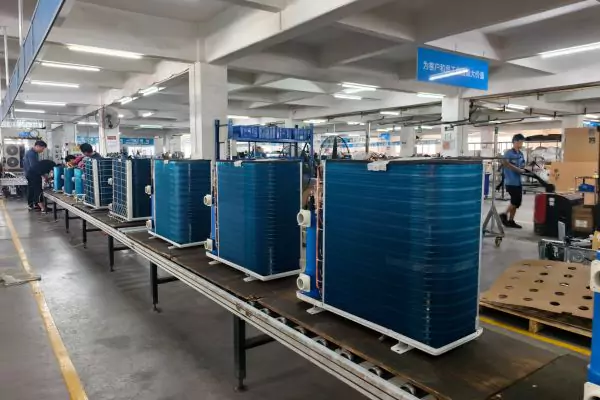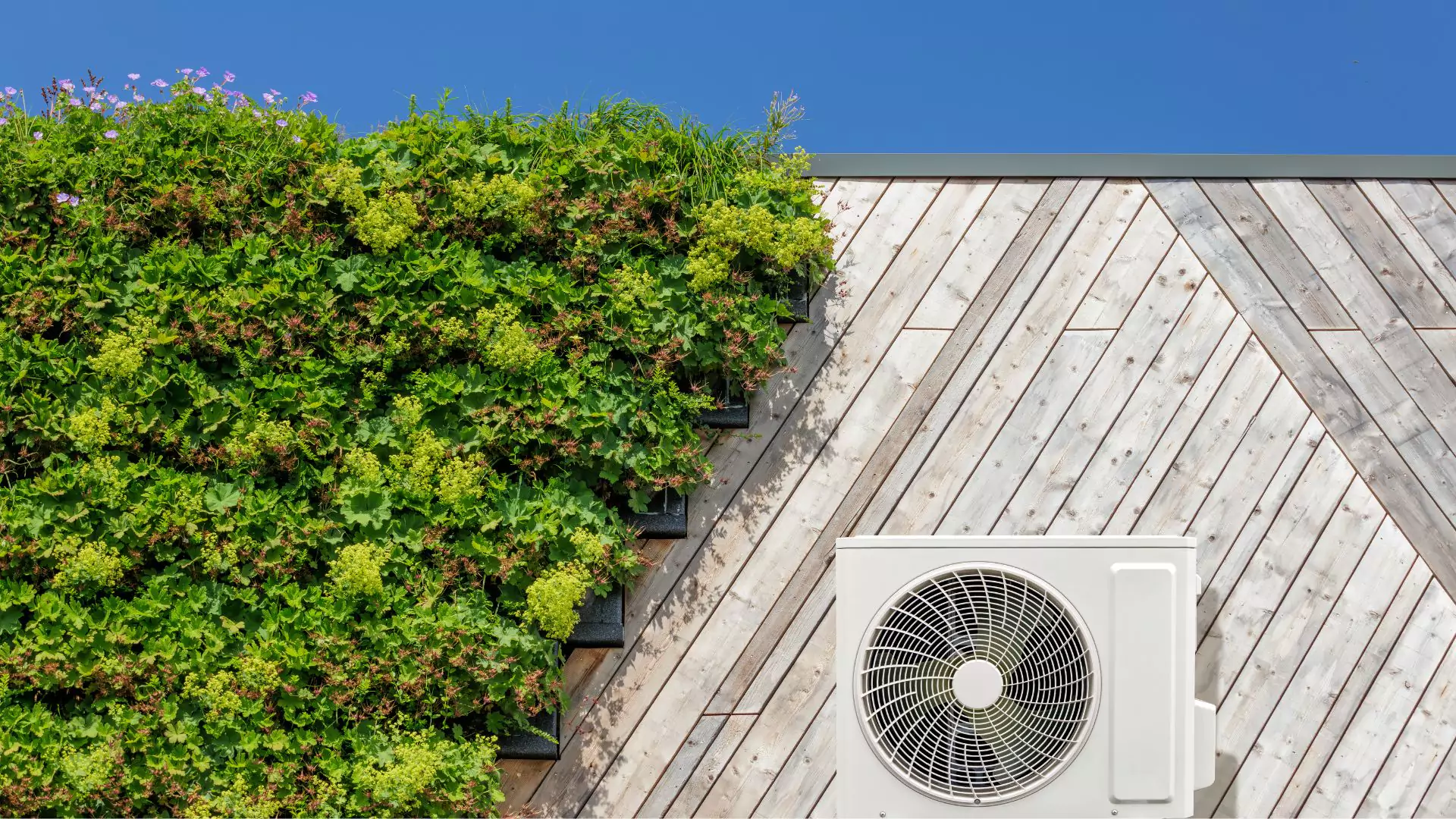| 기능 | 가치 |
|---|---|
| 에너지 절약 | 에너지 요금 30~501TP3% 절감 |
| 설치 비용 | $6,000-$8,000(2025년 평균) |
| 수명 | 적절한 관리 시 15~20년 |
| 최고 효율성 등급 | 최대 22 SEER2 / 10.5 HSPF2 |
| 투자 회수 기간 | 에너지 절약을 통한 5~7년 |
인버터 히트 펌프란 무엇인가요?
간단한 기술 설명
다음과 같이 생각해보십시오. 인버터 히트 펌프 자동차의 크루즈 컨트롤 시스템처럼 말이죠. 끊임없이 속도를 높이거나 낮추는 대신 필요한 속도에 정확히 맞춰 일정한 속도를 유지합니다. 마찬가지로 인버터 히트 펌프는 집의 난방 및 냉방 수요에 맞춰 압축기 속도를 자동으로 조절합니다.
완전히 켜지거나 꺼지는 기존 히트펌프와 달리 인버터 기술을 사용하면 시스템을 가변 속도로 작동할 수 있습니다. 즉, 가정에서 필요한 순간에 따라 0%에서 100% 용량까지 작동할 수 있습니다.
일반 히트 펌프와의 주요 차이점
기존의 히트 펌프는 전등 스위치처럼 완전히 켜지거나 완전히 꺼지는 방식으로 작동합니다. 하지만 인버터 히트펌프는 조광 스위치처럼 작동하여 정밀한 온도 제어가 가능합니다. 이 스마트한 기술은 시스템이 계속 켜지고 꺼질 때 발생하는 에너지 낭비를 없애줍니다.
"인버터 히트 펌프는 집 안의 상태를 분석하여 필요에 따라 0%에서 100%까지 전력 출력을 조정하여 기존 시스템에 비해 효율성과 쾌적성을 크게 향상시킵니다." - 제이콥스 난방 및 에어컨
얼마나 많은 비용을 절약할 수 있나요?
실제 달러 절약 사례
주택 소유자는 일반적으로 에너지 요금 30~501% 절감 인버터 히트 펌프로 전환한 후. 예를 들어 현재 난방 및 냉방 비용이 월 $200인 경우 인버터 시스템으로 전환하면 월 $60~$100을 절약할 수 있습니다.
온화한 기후에서 가족은 종종 연간 $300-$500 를 절약했다고 합니다. 또한, 이상적인 조건의 일부 주택 소유자는 더 높은 절감 효과를 보고 있으며, 추운 기후의 한 가정에서는 전환 후 난방비를 50% 절약했습니다.
투자 회수 기간 분석
대부분의 인버터 히트 펌프 설치는 다음 범위 내에서 비용을 지불합니다. 5~7년 에너지 절약만으로 달성할 수 있습니다. 일반적으로 다음과 같이 계산합니다:
- 1-3학년: 매월 상당한 비용 절감 효과 즉시 시작
- 4~6학년: 누적 절감액이 초기 투자에 근접
- 7학년 이상: 지속적인 에너지 절감으로 인한 순수익
기후가 저축에 미치는 영향
위치는 잠재적인 절감 효과에 큰 영향을 미칩니다. 연중 냉난방이 필요한 온화한 기후에서 가장 높은 수익을 얻을 수 있습니다. 또한 온도 변화가 극심한 지역은 인버터 기술이 제공하는 일관된 온도 제어의 이점을 가장 많이 누릴 수 있습니다.
최신 인버터 히트 펌프는 영하 13°F(-25°C)까지 효율적으로 작동하여 혹독한 겨울에도 기존 난방 시스템을 대체할 수 있기 때문에 추운 기후의 주택 소유자에게도 큰 도움이 됩니다.
총 비용에 영향을 미치는 요인
최종 설치 가격에 영향을 미치는 몇 가지 주요 요소가 있습니다:
- 홈 크기: 대형 주택일수록 더 강력한 시스템이 필요합니다.
- 기존 덕트: 수정 시 $1,000-$3,000 추가 가능
- 효율성 등급: SEER2 등급이 높을수록 초기 비용이 더 많이 듭니다.
- 브랜드 선택: 프리미엄 브랜드는 더 높은 가격을 요구합니다.
- 현지 인건비: 설치율은 지역에 따라 다릅니다.
파이낸싱 옵션 및 리베이트
많은 주택 소유자가 전체 비용을 선불로 지불하지 않습니다. 연방 세금 공제로 최대 30%까지 비용을 절감할 수 있으며, 많은 주에서 추가 리베이트를 제공합니다. 또한, HVAC 융자 프로그램을 이용하면 에너지 절감액보다 적은 금액을 월별로 납부할 수 있습니다.
일부 유틸리티 회사는 고효율 히트 펌프 설치에 대한 현금 환급을 제공하기도 하므로 초기 투자 비용을 수백 달러 절약할 수 있습니다.
저축을 넘어선 최고의 혜택
일관된 온도 제어
가장 눈에 띄는 이점 중 하나는 핫스팟 및 콜드스팟 제거 집 전체에 냉방을 제공합니다. 인버터 히트 펌프는 기존 시스템처럼 온도 변화를 일으키지 않고 출력을 지속적으로 조정하여 일정한 온도를 유지합니다.
이 일관된 편안함은 시스템이 꺼졌을 때 더 이상 춥거나 다시 켜졌을 때 너무 덥다고 느끼지 않아도 된다는 뜻입니다. 대신 생활 공간 전체에서 안정적이고 편안한 온도를 즐길 수 있습니다.
"인버터 히트 펌프는 실외 온도가 영하로 내려가도 실내 온도를 일정하게 유지하여 기존 시스템에서 흔히 볼 수 있는 온도 변동을 없애줍니다." - 미쓰비시 전기
더 조용한 작동
인버터 히트 펌프는 지속적으로 켜고 끄지 않기 때문에 기존 시스템보다 훨씬 더 조용하게 작동합니다. 많은 모델이 56dBA의 낮은 소음 수준를 누르면 일반 대화보다 조용합니다.
이 조용한 작동은 소음이 방해가 될 수 있는 침실과 거실에 특히 유용합니다. 따라서 많은 주택 소유자가 인버터 시스템으로 전환한 후 수면의 질이 향상되었다고 보고합니다.
시스템 수명 연장
가변 속도 작동으로 시스템 구성 요소의 마모를 줄여 장비 수명을 연장합니다. 기존 히트 펌프는 일반적으로 10~15년 정도 지속됩니다, 인버터 히트 펌프는 종종 15~20년 동안 효율적으로 작동합니다. 적절한 유지 관리가 필요합니다.
이렇게 수명이 길어지면 시간이 지남에 따라 교체 비용이 줄어들어 가정 내 편안함을 위해 인버터 기술을 선택할 때의 전반적인 가치 제안이 더욱 커집니다.
💡 프로 팁: 인버터 히트펌프는 에너지 절약, 일관된 쾌적성, 긴 수명이 결합되어 대부분의 주택 소유자에게 장기적으로 훌륭한 투자가 됩니다.
중국 최고 등급의 인버터 히트 펌프 제조업체
중국은 약 전 세계 히트 펌프의 80% 국제에너지기구에 따르면 이 기술의 글로벌 제조 허브로 자리매김하고 있습니다.
ZN(중누안 뉴 에너지)2008년에 설립되어 중국 칭다오에 본사를 두고 있으며, 다음과 같은 제품을 전문으로 하는 선도적인 제조업체입니다. 첨단 인버터 히트 펌프 기술 가변 속도 압축기 시스템과 에너지 효율적인 솔루션에 대한 깊은 전문성을 갖추고 있습니다.

주요 회사 하이라이트:
- 15년 이상 의 인버터 히트 펌프 전문화 제조 경험
- 심층적인 인버터 기술 전문성 가변 속도 컴프레서 설계 및 제어
- 15,000m² 규모의 최첨단 시설 150명의 직원과 함께 광저우에서
- 연간 100,000대 생산 능력 자동화된 인버터 히트 펌프 생산 라인
- 고급 인버터 R&D 역량 초저온 시뮬레이션 랩 포함
- 전문 전자 연구 실험실 인버터 제어 시스템 개발용
- 검증된 인버터 성능 업계 최고 수준의 SEER2 등급으로 업계 최고의 표준을 준수합니다.
- 품질 중심의 인버터 제조 국제 효율성 요구 사항 충족
유지 관리: 유지 관리: 알아야 할 사항
간단한 유지 관리 체크리스트
유지 관리 인버터 히트 펌프 는 놀라울 정도로 간단하고 기존 시스템과 유사합니다. 정기적인 유지보수를 통해 최적의 성능을 보장하고 시스템의 수명을 15~20년으로 크게 연장할 수 있습니다.
필수 유지 관리 체크리스트는 다음과 같습니다:
- 월간: 공기 필터 점검 및 청소
- 분기별: 실외기에서 이물질 제거
- 계절에 따라 다릅니다: 덕트 배관 누수 검사
- 매년: 전문 검사 예약
연간 유지 관리 비용
전문 유지 관리 비용은 일반적으로 다음과 같습니다. 연간 $150-$300는 지역과 서비스 제공업체에 따라 다릅니다. 하지만 이러한 투자는 비용이 많이 드는 수리를 방지하고 시스템 수명 기간 동안 최고의 효율성을 유지합니다.
연례 방문 시 기술자는 냉매 레벨을 확인하고 전기 연결을 검사하며 모든 구성 요소가 올바르게 작동하는지 확인합니다. 결과적으로 이러한 사전 예방적 접근 방식은 긴급 수리 요청에 비해 비용을 절감할 수 있습니다.
DIY 대 전문 작업
필터 교체 및 실외기 청소와 같은 기본적인 작업은 집주인이 직접 처리할 수 있지만, 특정 유지관리는 전문가의 전문 지식이 필요합니다. 예를 들어 냉매 잔량 점검과 전기 점검은 항상 공인된 HVAC 기술자가 수행해야 합니다.
또한 보증 요건에는 전문적인 유지보수가 명시되어 있는 경우가 많으므로 제조업체의 가이드라인을 준수하면 투자를 보호하고 보증이 유효하게 유지됩니다.
그만한 가치가 있을까요? (결론)
인버터 히트 펌프를 고려해야 하는 대상
인버터 히트 펌프가 탁월한 이유 대부분의 주택 소유자, 특히 에너지 요금을 줄이면서 쾌적함을 개선하고자 하는 사람들에게 적합합니다. 특히 일정한 온도와 조용한 작동을 중요하게 생각하는 가정에 유용합니다.
이 시스템은 다양한 기후 조건에서 탁월한 성능을 발휘하기 때문에 온화한 기후에서 추운 기후의 주택 소유자가 가장 큰 혜택을 볼 수 있습니다. 또한 환경을 생각하는 소비자들은 에너지 소비를 줄이고 탄소 발자국을 줄인다는 점을 높이 평가합니다.
가장 의미가 있을 때
인버터 히트 펌프를 고려하세요:
- 현재 에너지 요금이 높은 경우($150/월 이상)
- 집안의 온도 불일치 경험
- 5년 이상 거주할 계획이 있는 경우
- 환경에 미치는 영향을 줄이고 싶으신가요?
- 조용한 HVAC 작동의 가치
기후 고려 사항 및 ROI 요약
최신 인버터 히트 펌프는 대부분의 기후에서 효과적으로 작동하며 영하 13°F(-25°C)까지도 효율적으로 작동합니다. 따라서 북부 지역 주택 소유자도 이 기술의 이점을 누릴 수 있습니다.
투자 수익은 일반적으로 5~7년 이내에 손익분기점을 넘기며, 그 이후에는 순수하게 저축 효과를 누릴 수 있습니다. 또한 주택 가치 상승과 안락함 개선은 전반적인 가치 제안에 추가됩니다.
✅ 결론: 대부분의 주택 소유주에게 인버터 히트 펌프는 장기적인 비용 절감과 쾌적성 향상을 통해 초기 투자를 정당화할 수 있는 강력한 이점을 제공합니다.
자주 묻는 질문
일반적인 주택 소유자 우려 사항
Q: 인버터 히트 펌프는 매우 추운 날씨에도 작동하나요?
A: 예, 최신 인버터 히트 펌프는 -13°F(-25°C)까지도 효율적으로 작동합니다. 고급 모델은 가변 속도 컴프레서와 향상된 냉매를 사용하여 혹독한 겨울철 조건에서도 성능을 유지합니다.
Q: 인버터 히트 펌프의 수명은 얼마나 되나요?
A: 적절한 유지보수를 통해 인버터 히트 펌프는 일반적으로 가변 속도 작동으로 인한 마모 감소로 인해 기존 시스템보다 수명이 긴 15~20년 정도 지속됩니다.
Q: 인버터 히트 펌프는 소음이 있나요?
A: 아니요, 실제로 기존 시스템보다 더 조용합니다. 많은 모델이 56dBA의 낮은 소음 수준에서 작동하며 이는 일반적인 대화보다 더 조용합니다.
질문: SEER2와 기존 SEER 등급의 차이점은 무엇인가요?
A: SEER2는 보다 현실적인 효율 측정을 제공하는 업데이트된 2025년 효율 표준입니다. 고효율 인버터 히트 펌프는 최대 22 SEER2를 달성할 수 있습니다.
Q: 인버터 히트 펌프를 직접 설치할 수 있나요?
A: 아니요, 안전, 보증 범위 및 최적의 성능을 위해서는 전문가의 설치가 필요합니다. 또한 대부분의 지역에서는 허가 및 면허를 소지한 계약업체의 설치가 필요합니다.
Q: 기존 덕트를 교체해야 하나요?
A: 반드시 그렇지는 않습니다. 대부분의 인버터 열 펌프는 기존 덕트와 함께 작동하지만 최적의 성능을 위해 수정이 필요할 수 있습니다. 계약업체가 고객의 구체적인 상황을 평가할 것입니다.
Q: 인버터 히트 펌프는 얼마나 많은 유지보수가 필요하나요?
A: 유지관리는 기존 시스템과 유사하며, 매월 필터 교체, 계절별 청소, 연간 전문 점검이 이루어집니다. 연간 유지보수 비용은 일반적으로 $150-$300입니다.
결론
인버터 히트 펌프는 2025 년 대부분의 주택 소유자에게 다음과 같은 이점을 제공하는 현명한 투자가 될 것입니다. 30-50% 에너지 절약일관된 편안함, 조용한 작동이 특징입니다. 설치 비용은 $6,000~$8,000달러, 투자 회수 기간은 5~7년으로 장기적으로 뛰어난 가치를 제공합니다.
미쓰비시전기, 캐리어, Trane과 같은 최고의 브랜드에서 추운 기후에서도 효과적으로 작동하는 안정적인 시스템을 제공하는 등 기술이 크게 발전했습니다. 또한 에너지 효율, 수명 연장, 쾌적성 개선의 조합으로 기존 HVAC 시스템보다 매력적인 업그레이드가 가능합니다.


